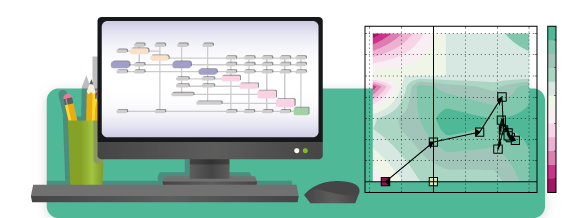Main Concepts
Discipline
Define an input-output discipline to interface a model.
Features: analytic expressions, executable, surrogate model, much more.
Design Space
Define a set of parameters, typically design parameters.
Features: deterministic parameter space, uncertain (or mixed) parameter space.
Scenario
Define an evaluation process over a design space for a set of disciplines and a given objective.
Features: DOE scenario, MDO scenario.
Features
Study Prototyping
An intuitive tool to discover MDO without writing any code, and define the right MDO problem and process. From an Excel workbook, "specify your disciplines, design space, objective and constraints, "select an MDO formulation and plot both coupling structure (N2 chart) "and MDO process (XDSM), even before wrapping any software.
DOE & Trade-off
Define, solve and post-process a trade-off problem from a DOE (design of experiments) algorithm.
Algorithms: axial, bilevel full-factorial, Box-Behnken, central-composite, composite, custom, diagonal, Faure, full-factorial, Halton, Haselgrove, LHS, Monte Carlo, Plackett-Burman, reverse Halton, Sobol.
MDO formulations
Define the way as the disciplinary coupling is formulated and managed by the optimization or DOE algorithm.
Algorithms: bi-level, IDF, MDF, sequential.
MDA
Find the coupled state of a multidisciplinary system using a Multi-Disciplinary Analysis.
Algorithms: Gauss-Seidel, Jacobi, MDAChain, Newton-Raphson, Quasi-Newton, Gauss-Seidel / Newton.
Visualization
Generate graphical post-processings of optimization histories.
Algorithms: basic history, constraints history, correlations, gradient sensitivity, k-means, objective and constraint history, optimization history view, optimization history view, quadratic approximation, radar chart, robustness, scatter matrix, self organizing map, variable influence.
Surrogate models
Replace a discipline by a surrogate one relying on a machine learning regression model.
Algorithms: Gaussian process regression (Kriging), linear model, radial basis regression, polynomial chaos expansion.
based on OpenTURNS, scikit-learn.
Scalable models
Use scalable data-driven models to compare MDO formulations and algorithms for different problem dimensions.
Features: scalability study, scalable problem, scalable discipline, diagonal-based.
Machine learning
Apply clustering, classification and regression methods from the machine learning community.
Features: clustering, classification, regression, quality measures, data transformation.
based on OpenTURNS, scikit-learn.
Uncertainty
Define, propagate, analyze and manage uncertainties.
Features: distribution, uncertain space, empirical and parametric statistics, distribution fitting, sensitivity analysis.
based on OpenTURNS.

